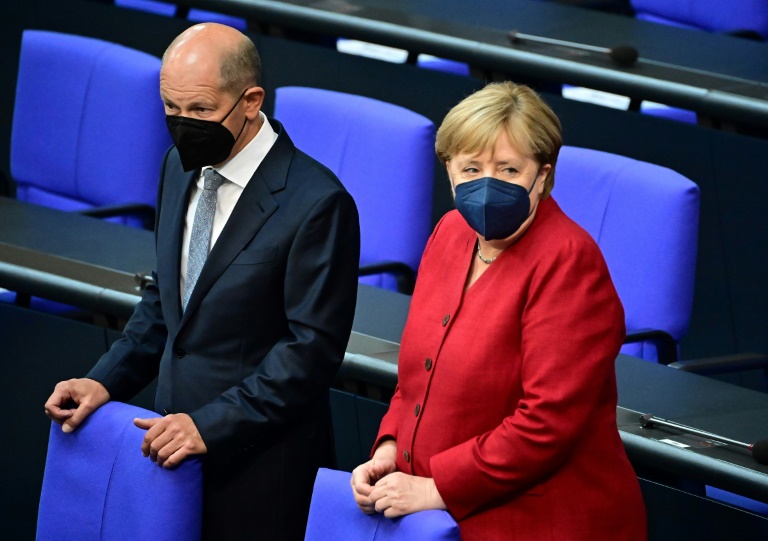German leaders including Chancellor Angela Merkel and her designated successor Olaf Scholz are expected to approve a de-facto “lockdown for the unvaccinated” on Thursday to combat surging Covid cases.
Merkel, Scholz and the leaders of Germany’s 16 states tightened Covid restrictions just two weeks ago, but are in talks again to impose even tougher measures amid a raging fourth wave of the virus.
According to a draft agreement seen by AFP, the plans include a blanket ban on entering bars, restaurants, theatres, cinemas and other leisure facilities for anyone who has not been vaccinated or recovered from Covid — a system known as 2G in Germany.
The unvaccinated would also be banned from Christmas markets and non-essential shops, as well as be hit by contact restrictions limiting the number of people they can socialise with.
The agreement also calls for new restrictions on large gatherings, which would affect events such as Bundesliga football matches, and the closure of nightclubs in areas with a weekly incidence rate above 350 infections per 100,000 people.
Health Minister Jens Spahn, in a caretaker role ahead of the planned swearing in of a new government next week, told the ZDF broadcaster that Germany needed “a lockdown, so to speak, for the unvaccinated”.
– ‘Never been as threatening’ –
Infections have smashed German records in recent weeks and hospitals are sounding the alarm, with many over capacity and forced to dispatch patients elsewhere in the country for treatment.
Though Germany’s seven-day incidence rate has fallen slightly this week, it still stood at 439.2 on Thursday, with 73,209 new cases recorded in the past 24 hours.
“From the point of view of intensive and emergency medicine, the pandemic situation has never been as threatening and serious as it is today,” the DIVI intensive care association warned on Wednesday, calling for a drastic tightening of restrictions.
Several hard-hit German regions have already cancelled Christmas markets and barred the unvaccinated from public spaces like gyms and leisure facilities to slow the pandemic spread.
But critics say the patchwork of rules is confusing, and Thursday’s emergency talks are aimed at coming up with nationwide rules.
The draft agreement also expresses support for compulsory vaccination in Germany, suggesting February as a possible start date. Scholz said earlier this week that he wants parliament to vote on the matter before the end of the year.
“Too many people have not got vaccinated,” Scholz told Bild television. Making jabs compulsory is justified “to protect us all”, he said.
– ‘Dramatic situation’ –
Many experts have partly blamed Germany’s fourth wave on its relatively low vaccination rate of around 68 percent, compared to fellow EU countries such as Spain at 79 percent and Portugal at 86 percent.
Merkel’s outgoing government had always ruled out mandatory vaccination, but the measure is now backed by politicians from across the spectrum.
Merkel’s spokeswoman on Wednesday said Germany was “in a dramatic situation in the pandemic where new possibilities have to be thought about”.
Germany already announced plans earlier this month to require health workers and soldiers to get inoculated against Covid-19.
Expanding that to the general public would see the country follow the example of neighbouring Austria, which is planning mandatory vaccinations from February.
Greece has announced mandatory jabs for over 60s, with unvaccinated people facing fines if they don’t comply.
EU chief Ursula von der Leyen said Wednesday it was time for the bloc to “think about mandatory vaccination” against Covid, though she also stressed it was up to individual states to make the decision.
“My personal position is… I think it is understandable and appropriate to lead this discussion now,” she said.









